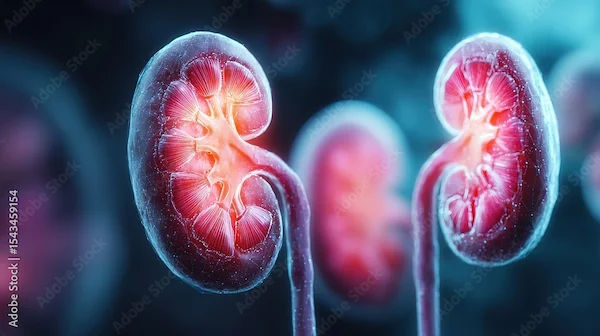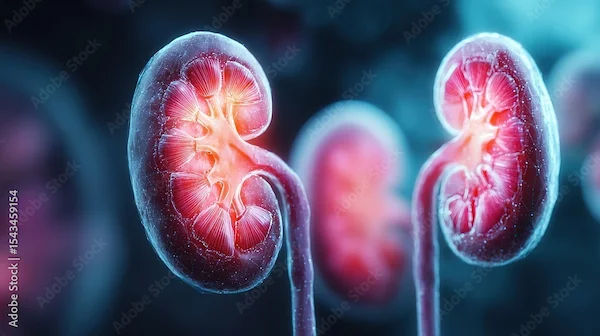Kidney Failure Consequences: Understanding The Impact On Health And Well-being
Kidney failure affects overall health, leading to fatigue, fluid retention, and toxin buildup. Learn about its consequences, complications, and treatment options to manage symptoms and improve quality of life.

Written by
Last updated on 3rd Jul, 2025
Introduction
Kidney failure, often referred to as end-stage renal disease (ESRD), is a serious condition where the kidneys lose the ability to perform their vital functions. The kidneys are crucial for filtering waste and excess fluids from the blood, balancing electrolytes, and regulating blood pressure. When they fail, the body’s systems begin to unravel, leading to a wide range of health complications.
The effects of kidney failure go far beyond just the loss of kidney function—they impact nearly every aspect of a person’s health and can significantly reduce their quality of life. Whether it’s fluid buildup, complications like heart disease, or the mental and emotional toll, kidney failure presents a complex set of challenges. In this guide, we’ll take a closer look at the consequences of kidney failure, how it affects the body, and the treatments that help manage its impact.
The Vital Role of the Kidneys
The kidneys are two bean-shaped organs located on either side of the spine, just below the ribcage. They play a crucial role in maintaining overall health by performing several essential functions, including:
Filtering Waste and Toxins: The kidneys filter waste products and excess fluids from the blood, excreting them as urine.
Regulating Electrolyte Balance: They help maintain the balance of essential electrolytes, such as sodium, potassium, and calcium, in the blood.
Controlling Blood Pressure: The kidneys produce hormones that regulate blood pressure and fluid balance.
Producing Red Blood Cells: They release erythropoietin, a hormone that stimulates the production of red blood cells in the bone marrow.
Maintaining Acid-Base Balance: The kidneys help regulate the body's pH levels by excreting excess acids and reabsorbing bicarbonate.
Regulating Bone Health: The kidneys activate vitamin D, which helps the body absorb calcium for strong and healthy bones. They also regulate calcium and phosphorus levels, supporting bone health.
When the kidneys fail, they can no longer perform their essential functions, which can trigger a series of health problems, including:
1. Accumulation of Waste Products
One of the primary consequences of kidney failure is the accumulation of waste products and toxins in the blood. This condition, known as uremia, can lead to a range of symptoms, including:
Nausea and Vomiting: The buildup of waste products can irritate the digestive system, causing nausea and vomiting.
Fatigue and Weakness: Toxins in the blood can affect energy levels, leading to persistent fatigue and weakness.
Confusion and Cognitive Impairment: High levels of waste products can impair cognitive function, leading to confusion, difficulty concentrating, and memory problems.
Loss of Appetite: The accumulation of toxins can affect taste and appetite, leading to weight loss and malnutrition.
2. Fluid Retention and Edema
Kidney failure can lead to fluid retention, as the kidneys are unable to excrete excess fluids from the body. This can result in oedema, which is the swelling of tissues due to fluid accumulation. Common areas affected by oedema include:
Legs and Ankles: Swelling in the lower extremities is common in kidney failure patients.
Hands and Feet: Swelling can also occur in the hands and feet, making it difficult to wear rings or shoes.
Face and Eyelids: Puffiness around the eyes and facial swelling are also common signs of fluid retention.
Lungs: In severe cases, fluid can accumulate in the lungs, causing shortness of breath and difficulty breathing.
3. Cardiovascular Complications
Kidney failure significantly increases the risk of cardiovascular diseases, including:
Hypertension (High Blood Pressure): The kidneys play a vital role in regulating blood pressure. When they fail, blood pressure can become elevated, leading to hypertension.
Heart Disease: The strain on the cardiovascular system due to fluid overload and hypertension can increase the risk of heart disease, including coronary artery disease, heart attacks, and heart failure.
Stroke: Elevated blood pressure and the buildup of waste products can also increase the risk of stroke.
4. Anemia
Anaemia is a common consequence of kidney failure. The kidneys produce erythropoietin, a hormone that stimulates the production of red blood cells. When kidney function declines, erythropoietin production decreases, leading to anaemia. Symptoms of anaemia include:
Fatigue and Weakness: Reduced oxygen-carrying capacity of the blood leads to persistent fatigue and weakness.
Pale Skin: The skin may appear pale due to the decreased number of red blood cells.
Shortness of Breath: Anemia can cause shortness of breath, especially during physical activity.
5. Bone and Mineral Disorders
Kidney failure can disrupt the balance of calcium, phosphorus, and vitamin D in the body, leading to bone and mineral disorders. These complications include:
Osteoporosis: The loss of calcium and vitamin D can weaken bones, making them more susceptible to fractures.
Hyperphosphatemia: High levels of phosphorus in the blood can lead to itching, joint pain, and cardiovascular complications.
Secondary Hyperparathyroidism: The parathyroid glands may produce excess parathyroid hormone (PTH) in response to imbalanced calcium and phosphorus levels, leading to bone pain and deformities.
6. Hyperkalemia
Hyperkalemia is a condition characterised by elevated potassium levels in the blood. The kidneys help regulate potassium balance, and when they fail, potassium levels can become dangerously high. Symptoms of hyperkalemia include:
Muscle Weakness: Elevated potassium levels can cause muscle weakness and fatigue.
Irregular Heartbeats: Hyperkalemia can lead to arrhythmias or irregular heartbeats, which can be life-threatening if not managed promptly.
Cardiac Arrest: In severe cases, hyperkalemia can lead to cardiac arrest.
7. Metabolic Acidosis
The kidneys help maintain the body's acid-base balance by excreting excess acids and reabsorbing bicarbonate. In kidney failure, the inability to excrete acids can lead to metabolic acidosis. Symptoms of metabolic acidosis include:
Nausea and Vomiting: The buildup of acids can irritate the digestive system.
Fatigue and Weakness: Acidosis can lead to fatigue and weakness.
Rapid Breathing: The body may try to compensate for acidosis by increasing breathing rate.
8. Digestive Issues
Kidney failure can also affect the digestive system, leading to symptoms such as:
Nausea and Vomiting: The accumulation of waste products can cause gastrointestinal irritation.
Loss of Appetite: Patients may experience a reduced appetite and weight loss.
Gastrointestinal Bleeding: In severe cases, kidney failure can lead to gastrointestinal bleeding.
9. Decreased Quality of Life
The symptoms and complications of kidney failure can significantly impact an individual's quality of life. Chronic fatigue, pain, and the need for ongoing medical treatments can make daily activities challenging. Additionally, the psychological impact of living with a chronic condition can lead to depression and anxiety.
Kidney Failure Treatment Options
Kidney failure is a serious condition, but it's important to know that treatment options are available to help manage the condition and enhance the quality of life for those affected. These treatments include:
Dialysis: Dialysis is a treatment that removes waste products and excess fluid from the blood when the kidneys can no longer do so. There are two main types of dialysis: hemodialysis and peritoneal dialysis.
Kidney Transplant: A kidney transplant is a surgical procedure to replace a failed kidney with a healthy kidney from a donor. This can restore kidney function and improve quality of life.
Medications: Various medications can help manage symptoms and complications of kidney failure, such as blood pressure medications, phosphate binders, and erythropoietin-stimulating agents.
Lifestyle Changes: Patients are often advised to make lifestyle changes, such as following a kidney-friendly diet, staying hydrated, and avoiding smoking and excessive alcohol consumption.
Conclusion
Kidney failure can deeply affect a person’s health and overall well-being, impacting nearly every aspect of their life. Understanding these effects is crucial for both patients and caregivers, as it can help them navigate the challenges and improve their quality of life. Early detection and proactive management of chronic kidney disease are key in preventing the condition from advancing to kidney failure. If you or someone you care about is experiencing symptoms of kidney failure, it’s important to seek medical help as soon as possible. Working closely with healthcare professionals to create a tailored treatment plan can make a significant difference in managing the condition.
Consult Top Nephrologists
Consult Top Nephrologists

Dr. S Bipin Kumar
Nephrologist
13 Years • MBBS, MD General Medicine, DM, Nephrology
Rajamahendravaram
SG KIDNEY CARE, Rajamahendravaram

Dr. Govardhan Gupta
Nephrologist
15 Years • MBBS, DNB General Medicine, DrNB Nephrology
Mumbai
Oscar Superspeciality Hospital, Mumbai

Dr. Luvdeep Dogra
Nephrologist
10 Years • MBBS, MD, DM (NEPHORLOGY)
Jaipur
Dr Dogras Health Clinic, Jaipur

Dr. Siddharth Herur
Nephrologist
4 Years • MBBS, MD General Medicine, DM Nephrology
Kurnool
Medicover hospital and Gurudatta poly clinic, Kurnool

Dr. Anantha Rao
Nephrologist
7 Years • MBBS, DNB (General Medicine), DNB (Nephrology)
Kurnool
Aakash hospital and KIMS hospital, Kurnool
_1.webp)
_4.webp)
_6.webp)

